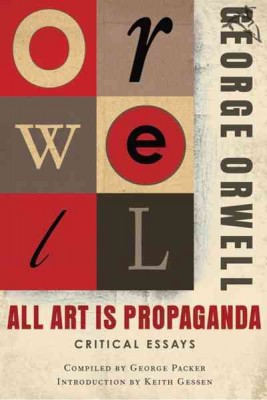| All Art Is Propaganda: Critical Essays Contributor(s): Orwell, George (Author), Gessen, Keith (Author), Gessen, Keith (Introduction by) |
|
 |
ISBN: 0156033070 ISBN-13: 9780156033077 Publisher: Mariner Books Classics OUR PRICE: $15.29 Product Type: Paperback - Other Formats Published: October 2009 Annotation: As a critic, George Orwell cast a wide net. Equally at home discussing Charles Dickens and Charlie Chaplin, he moved back and forth across the porous borders between essay and journalism, high art and low. A frequent commentator on literature, language, film, and drama throughout his career, Orwell turned increasingly to the critical essay in the 1940s, when his most important experiences were behind him and some of his most incisive writing lay ahead. "All Art Is Propaganda "follows Orwell as he demonstrates in piece after piece how intent analysis of a work or body of work gives rise to trenchant aesthetic and philosophical commentary. With masterpieces such as "Politics and the English Language" and "Rudyard Kipling" and gems such as "Good Bad Books," here is an unrivaled education in, as George Packer puts it, "how to be interesting, line after line."
|
| Additional Information |
| BISAC Categories: - Literary Collections | Essays - Literary Collections | European - English, Irish, Scottish, Welsh - Literary Collections | Letters |
| Dewey: 824.912 |
| Lexile Measure: 1300 |
| Physical Information: 0.99" H x 5.36" W x 7.86" (0.72 lbs) 416 pages |
| Descriptions, Reviews, Etc. |
| Publisher Description: As a critic, George Orwell cast a wide net. Equally at home discussing Charles Dickens and Charlie Chaplin, he moved back and forth across the porous borders between essay and journalism, high art and low. A frequent commentator on literature, language, film, and drama throughout his career, Orwell turned increasingly to the critical essay in the 1940s, when his most important experiences were behind him and some of his most incisive writing lay ahead. All Art Is Propaganda follows Orwell as he demonstrates in piece after piece how intent analysis of a work or body of work gives rise to trenchant aesthetic and philosophical commentary. With masterpieces such as Politics and the English Language and Rudyard Kipling and gems such as Good Bad Books, here is an unrivaled education in, as George Packer puts it, how to be interesting, line after line. |
Contributor Bio(s): Packer, George: - GEORGE PACKER is a staff writer for The New Yorker and author of The Assassin's Gate: America in Iraq and other works. He lives in Brooklyn.Gessen, Keith: - Keith Gessen was born in Russia and educated at Harvard. He is a founding editor of n+1 and has written about literature and culture for Dissent, The Nation, The New Yorker, and the New York Review of Books. He is the author of the novel All the Sad Young Literary Men.Orwell, George: - GEORGE ORWELL (1903-1950) was born in India and served with the Imperial Police in Burma before joining the Republican Army in the Spanish Civil War. Orwell was the author of six novels as well as numerous essays and nonfiction works. |